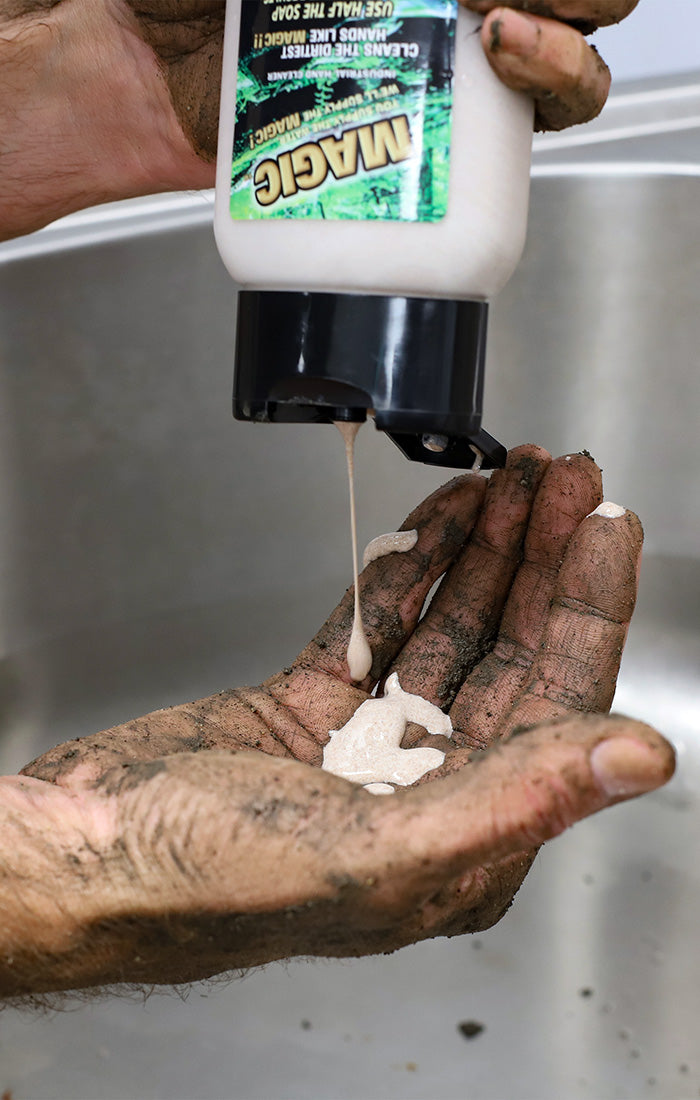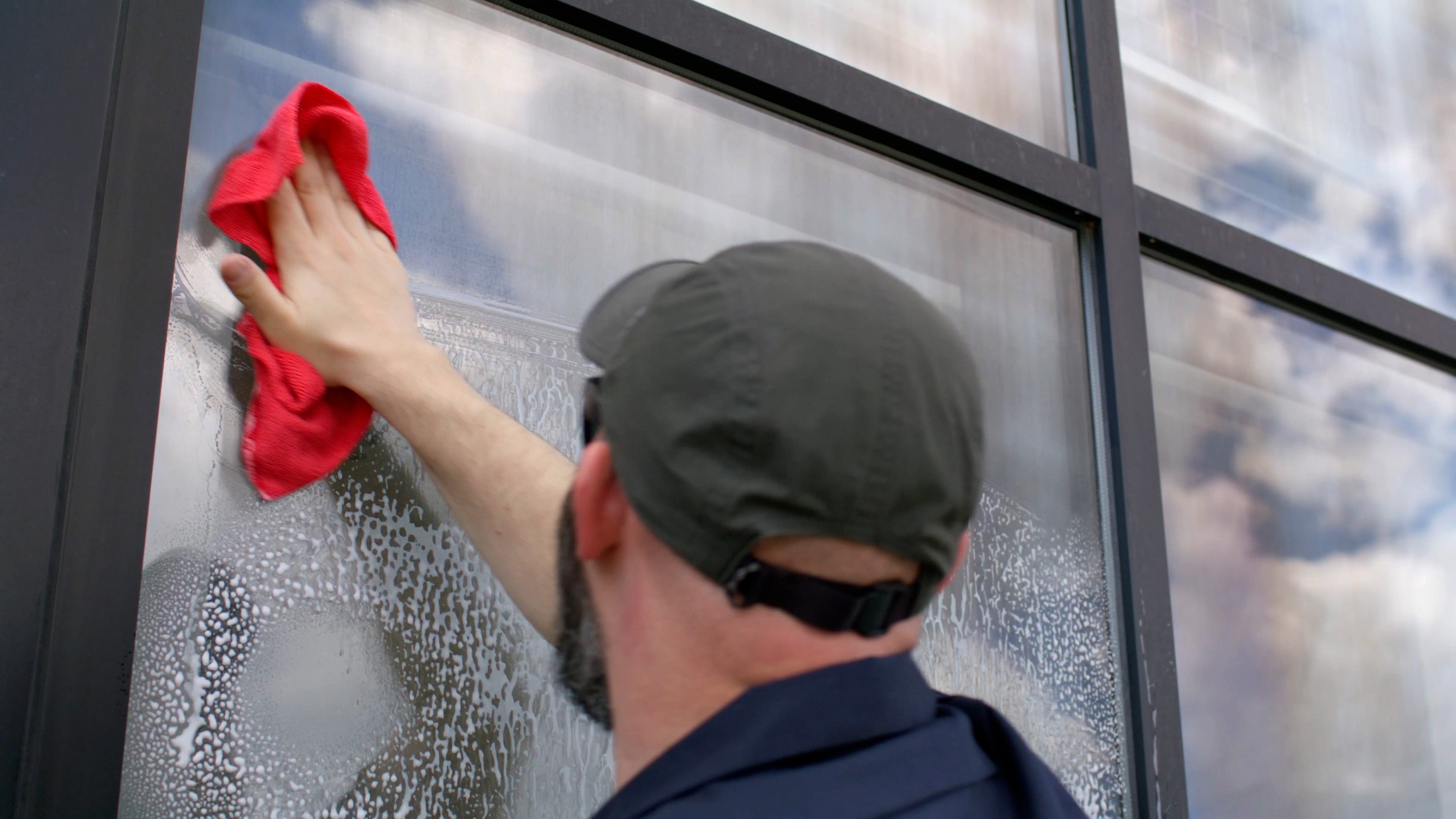THE IMPORTANCE OF GLASS CLEANER
Glass cleaners play a key role in maintaining safe and healthy environments in commercial, residential, and industrial settings. Clean, clear, streak-free windows and glass surfaces create aesthetically pleasing environments that are productive and healthy, so choosing the right product is essential to success.
Likewise, glass cleaners are used beyond traditional glass and window surfaces and are used to polish and protect materials such as acrylic, porcelain, marble, chrome, and more, but using glass cleaners as a “finisher” is more of a life hack than a product usage recommendation.
TYPES OF GLASS CLEANERS
Different types of glass cleaners yield different results, so understanding the types and uses is important to achieve the cleanliness you or your customers need.
The industry tends to use two different categories to differentiate between cleaners: ammoniated and non-ammoniated. Most glass cleaners have alcohol in them in some amount, but the true difference lies in the ammonia or lack thereof.
-
Ammoniated glass cleaners contain ammonia, which serves as a great cleaner, but tend to have some drawbacks such as smell and the ability for it to damage certain surfaces such as tinted windows. Likewise, some manufacturers tend to use more fragrance in the formula to cover up the ammonia smell, but when done improperly, this can leave residue on the glass.
-
Non-ammoniated glass cleaners do not contain ammonia but still have excellent cleaning capabilities, tend to be more user friendly, and have a less offensive odor.
-
Specialty cleaners are used to clean not only glass, but acrylic, polycarbonate, and Plexiglass surfaces. These glass cleaners are anti-static and are great for cleaning acrylic signs, acrylic dividers, Plexiglass walls, and more in residential and commercial applications.
INDUSTRY APPLICATIONS
Glass cleaners are used every day in a variety of applications. Industrial manufacturing plants, automotive detailing facilities, commercial offices, homes, and more all use glass cleaners to maintain clear glass surfaces and windows.
Use glass cleaners to restore safe, streak-free finishes on automotive windshields after detailing or maintenance work.
Tackle tough grime on windows in industrial warehouses or commercial buildings like hospitals, schools, and offices.
-
Our recommendations: ZenaClear & ZenaCrystal
Or, use anti-static glass cleaners to clean, polish, and protect acrylic, polycarbonate, Plexiglass, and other surfaces in commercial and residential settings. (Hint: opt for cleaners that have anti-static properties and minimize dust attraction for the best result!)
-
Our recommendation: ZenaPlex
No matter the industry, keeping surfaces like glass, acrylic, Plexiglass, and windows clean, clear, and well-maintained are vital to ensuring safe and sanitary working (and living) conditions.
CHOOSING THE RIGHT PRODUCT
As stated before, choosing the right glass cleaner for you or your customers’ needs are essential. Different ingredients yield different results, and some surfaces require specific solvents to work effectively.
For example, automotive detailers working with tinted windshields should opt for non-ammoniated cleaners to prevent any damage to the tint. Ammoniated glass cleaners can leave a haze or fog on automotive interior glass – caused by a reaction to cabin temperature changes and vents blowing on the windows, where particles stick to the cleaning agent.
For surfaces with tough soils, ammoniated products may provide a greater cleaning power than non-ammoniated – but you need to stay mindful of regulatory restrictions, surface type, and the smell. Anyone will tell you that the choice is based on your preference, so keep that in mind.
-
Assess your cleaning needs: What are you trying to clean & what is your desired result?
-
What is the surface? The surface being cleaned will often determine the product used. For example, use non-ammoniated products for tinted windshields, but opt for ammoniated products on chrome and other materials.
-
Consider the formula: Do you prefer foaming, liquid, or mist application? Which ingredient would work best for the surface (ammoniated, non-ammoniated, etc.)? What kind of scent works for your application?
REGULATORY MINDFULNESS
Certain regions adhere to specific regulatory restrictions based on the ingredients in the products you use. Some states have strict regulations on aerosols, so it’s important to comply when purchasing products. For example, in strict regions such as California, using non-ammoniated glass cleaners is the way to go.
BEST PRACTICES
Most professionals agree that the best way to use glass cleaning products is with microfiber cloths, but again, it is a matter of preference. Microfibers can help avoid streaks, keep fuzz and lint off the surface, and overall provide the best clean, but you need to replace them once they get wet and stop absorbing the product. Using materials such as paper-towels may cause streaks and result in fuzz-particles sticking to the surface, reducing the effectiveness.
The application material is up to the user but consider the surface and results when making the decision. The best way to ensure a perfect finish is to use a clean cloth/towel.
ASK THE EXPERT: JASON ARCHER
We asked Jason Archer, Vice President of Sales at Zenex International what he had to say about glass cleaners as well as insight into our product line. With over 20 years’ experience, this is his advice:
What’s better, ammoniated or non-ammoniated glass cleaners?
“In my opinion, non-ammoniated glass cleaners are more user friendly, our formulas clean just as well as ammoniated cleaners, and they don’t have the ammonia smell. We formulate with the exact amount of fragrance needed in our products to avoid any residue. Customers really enjoy our fragrances. It’s personal preference at the end of the day.”
What makes a good glass cleaner?
“There’s a fine line between putting too much in a product that’s going to leave residue but still putting enough where it will clean well. People also like fragrance, so you try to find what the majority like so it’s user friendly,” says Archer.
He also touched on the kind of spray pattern in glass cleaners, saying, “I personally prefer foaming aerosol glass cleaners – because it doesn’t run, you can see where it’s been sprayed, and you get a longer dwell time. It allows the chemical to do its job.”
Which Zenex glass cleaner is your favorite?
“I think we’ve got a lot of good glass cleaners in the line. Gleamonex is our top seller for a reason because of the formula, the fragrance, and the foam. In the automotive world, people love the fragrance and that it can be used on tinted windows.”
He went on to discuss his underrated favorite in the lineup: The Boss.
“The Boss doesn’t get talked about as much as it should. It’s our thixotropic glass cleaner, so it’s not a foam, it’s a gel that clings on but turns to liquid when you wipe.”
What’s so good about The Boss?
“In hot climates, a typical glass cleaner on a window when its 100 degrees out is going to evaporate away. The Boss doesn’t do that – it sticks around, so I think that’s a unique fact. It’s also ready to use so you don’t risk mixing it with hard water which will leave behind residues.”
SUMMARY
Overall, the glass cleaner you choose is up to you. We recommend being mindful of the surface you apply to, the ingredients that work best for your surface and region and using best practices when applying the product. For more information on glass cleaners, view our Glass Cleaners page.
At Zenex, we specialize in liquid & aerosol treatment technologies that keep surfaces clean and protected from everyday use — 24 hours per day, 365 days a year.
-
Full coverage, exceptional results: a comprehensive series of professional grade products is our game. Whether you need to clean, polish, restore, or maintain glass and other surfaces – we have you covered.
-
Professional quality every time: uniquely designed for automotive restoration and cleaning professionals, janitorial building service providers, and industrial facility managers.
FEATURED PRODUCTS:


